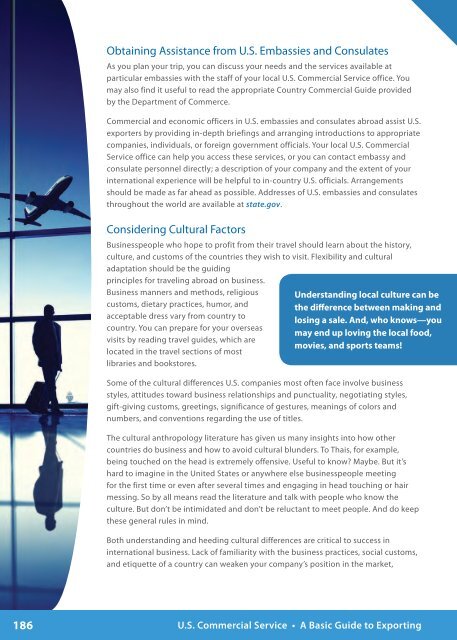basic-guide-to-exporting_Latest_eg_main_086196
basic-guide-to-exporting_Latest_eg_main_086196
basic-guide-to-exporting_Latest_eg_main_086196
Create successful ePaper yourself
Turn your PDF publications into a flip-book with our unique Google optimized e-Paper software.
Obtaining Assistance from U.S. Embassies and ConsulatesAs you plan your trip, you can discuss your needs and the services available atparticular embassies with the staff of your local U.S. Commercial Service office. Youmay also find it useful <strong>to</strong> read the appropriate Country Commercial Guide providedby the Department of Commerce.Commercial and economic officers in U.S. embassies and consulates abroad assist U.S.exporters by providing in-depth briefings and arranging introductions <strong>to</strong> appropriatecompanies, individuals, or foreign government officials. Your local U.S. CommercialService office can help you access these services, or you can contact embassy andconsulate personnel directly; a description of your company and the extent of yourinternational experience will be helpful <strong>to</strong> in-country U.S. officials. Arrangementsshould be made as far ahead as possible. Addresses of U.S. embassies and consulatesthroughout the world are available at state.gov.Considering Cultural Fac<strong>to</strong>rsBusinesspeople who hope <strong>to</strong> profit from their travel should learn about the his<strong>to</strong>ry,culture, and cus<strong>to</strong>ms of the countries they wish <strong>to</strong> visit. Flexibility and culturaladaptation should be the guidingprinciples for traveling abroad on business.Business manners and methods, religiouscus<strong>to</strong>ms, dietary practices, humor, andacceptable dress vary from country <strong>to</strong>country. You can prepare for your overseasvisits by reading travel <strong>guide</strong>s, which arelocated in the travel sections of mostlibraries and books<strong>to</strong>res.Understanding local culture can bethe difference between making andlosing a sale. And, who knows—youmay end up loving the local food,movies, and sports teams!Some of the cultural differences U.S. companies most often face involve businessstyles, attitudes <strong>to</strong>ward business relationships and punctuality, n<strong>eg</strong>otiating styles,gift-giving cus<strong>to</strong>ms, greetings, significance of gestures, meanings of colors andnumbers, and conventions r<strong>eg</strong>arding the use of titles.The cultural anthropology literature has given us many insights in<strong>to</strong> how othercountries do business and how <strong>to</strong> avoid cultural blunders. To Thais, for example,being <strong>to</strong>uched on the head is extremely offensive. Useful <strong>to</strong> know? Maybe. But it’shard <strong>to</strong> imagine in the United States or anywhere else businesspeople meetingfor the first time or even after several times and engaging in head <strong>to</strong>uching or hairmessing. So by all means read the literature and talk with people who know theculture. But don’t be intimidated and don’t be reluctant <strong>to</strong> meet people. And do keepthese general rules in mind.Both understanding and heeding cultural differences are critical <strong>to</strong> success ininternational business. Lack of familiarity with the business practices, social cus<strong>to</strong>ms,and etiquette of a country can weaken your company’s position in the market,186U.S. Commercial Service • A Basic Guide <strong>to</strong> Exporting





